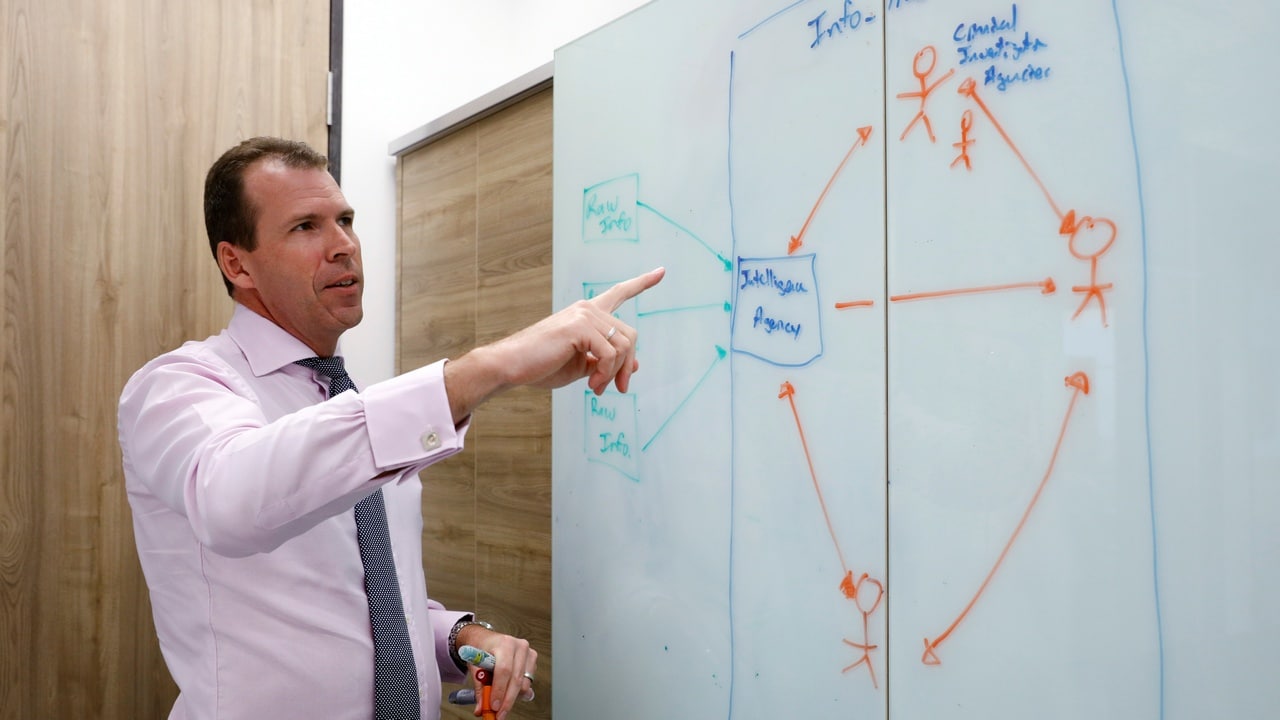Police and security agencies have so far only taken an interest in
**blockchain** - the distributed ledger technology behind cryptocurrencies like
**bitcoin** - for tracking criminals hiding illegal money from banks. [caption id=“attachment_4239535” align=“alignleft” width=“380”] A bitcoin sign is seen during Riga Comm 2017, a business technology and innovation fair. Image: Reuters[/caption] But that’s changing as some civilian, police and military agencies see blockchain as a potential solution to problems they have wrestled with for years: how to secure data, but also be able to share it in a way that lets the owner keep control. Australia, for example, has recently hired HoustonKemp, a Singapore-based consultancy, to build a blockchain-based system to record intelligence created by investigators and others, and improve the way important information is shared. “They’ve been trying for years to come up with a centralised platform, but people are reluctant to share information,” said Adrian Kemp, who runs the consultancy, which was awarded a A$1 million ($757,500) grant by AUSTRAC, Australia’s financial intelligence agency, and the Australian Criminal Intelligence Commission. Blockchain’s appeal for data sharing is threefold. Its ledger, or database, is not controlled by any single party and is spread across multiple computers, making it hard to break. Once entered, any information cannot be altered or tampered with. And, by using so-called smart contracts, the owner of information can easily tweak who has access to what. It’s a sign of how far blockchain technology has come within a decade since the publication of a pseudonymous paper describing bitcoin and the blockchain ledger that would record transactions in it. Bitcoin has since become the preferred currency not only of libertarians and speculators, but also of criminal hackers. The bitcoin price is volatile, and hit record peaks late last month. Governments are already exploring ways to store some data, such as land records, contracts and assets, in blockchains, and the financial industry, too, has experimented with blockchain technologies to streamline transactions and back-office systems, though with limited success. [caption id=“attachment_4239539” align=“alignnone” width=“1280”]
 Adrian Kemp of HoustonKemp Economists speaks to Reuters. Image: Reuters[/caption] SECURING SHARED DATA The closest most law enforcement agencies have come to the blockchain has been working with start-up firms to analyse it for evidence of criminal deals. But in the past year or so that attitude has begun to change. The United States Air Force (USAF) has funded research into how blockchain could ensure its data isn’t changed. In May, the Defence Advanced Research Projects Agency (DARPA) awarded a grant to the company behind an encrypted chat program to make a secure messaging service based on the blockchain. Amendments to a recent US Senate defence bill require the government to report back on “the potential offensive and defensive cyber applications of blockchain technology and other distributed database technologies” and how foreign governments, extremists and criminals might be using them. Britain, too, is exploring several uses of the blockchain, say consultants and companies working for several departments. Cambridge Consultants, a UK-based consultancy, said it had worked with the Defence Science and Technology Laboratory, a UK Ministry of Defence (MoD) agency, on using a blockchain to improve the trustworthiness of a network of sensors on, for example, security cameras. The UK’s justice ministry is looking at proving that evidence - video, emails, documents - hasn’t been tampered with by registering it all on a blockchain, according to a blog post on its website. Marcus Ralphs, a former soldier and now CEO of ByzGen Ltd, which makes blockchains for the security sector, said he was working on projects with the MoD using blockchain to track the status and level of individuals’ security clearance. Other work included helping the
**Foreign and Commonwealth Office** (FCO) improve the way work permits are issued and records stored. “PASSING THE BUCK” These are early days. Kemp says there’s no guarantee his project will be deployed more widely. And some who have worked with AUSTRAC are sceptical, saying such projects have more to do with agencies turning to the private sector because they’re running low on resources and ideas. “The government is just looking to pass the buck on to private industry,” said Simon Smith, a cyber private investigator who has worked on cases involving AUSTRAC. Many police forces and armies aren’t ready for the technological and mental leap necessary. The Police Foundation, a UK think-tank focusing on policing and crime, is pushing British police to explore the blockchain, but its director, Rick Muir, said “we are still at the stage of ‘what is blockchain?’.” Neil Barnas, a USAF major who last year wrote a thesis on the potential of blockchain in defence, said US military and security agencies were slowly waking up. The problem, he says, is that military minds are more inclined towards centralised systems than the decentralised ones that blockchain’s distributed ledger embraces. That said, blockchain’s association with the criminal underworld has not dented its appeal to those who see its potential, said ByzGen’s Ralphs. “The negative narrative around it has not at all watered down or diluted interest of the people we’ve been engaging with,” he said.
Adrian Kemp of HoustonKemp Economists speaks to Reuters. Image: Reuters[/caption] SECURING SHARED DATA The closest most law enforcement agencies have come to the blockchain has been working with start-up firms to analyse it for evidence of criminal deals. But in the past year or so that attitude has begun to change. The United States Air Force (USAF) has funded research into how blockchain could ensure its data isn’t changed. In May, the Defence Advanced Research Projects Agency (DARPA) awarded a grant to the company behind an encrypted chat program to make a secure messaging service based on the blockchain. Amendments to a recent US Senate defence bill require the government to report back on “the potential offensive and defensive cyber applications of blockchain technology and other distributed database technologies” and how foreign governments, extremists and criminals might be using them. Britain, too, is exploring several uses of the blockchain, say consultants and companies working for several departments. Cambridge Consultants, a UK-based consultancy, said it had worked with the Defence Science and Technology Laboratory, a UK Ministry of Defence (MoD) agency, on using a blockchain to improve the trustworthiness of a network of sensors on, for example, security cameras. The UK’s justice ministry is looking at proving that evidence - video, emails, documents - hasn’t been tampered with by registering it all on a blockchain, according to a blog post on its website. Marcus Ralphs, a former soldier and now CEO of ByzGen Ltd, which makes blockchains for the security sector, said he was working on projects with the MoD using blockchain to track the status and level of individuals’ security clearance. Other work included helping the
**Foreign and Commonwealth Office** (FCO) improve the way work permits are issued and records stored. “PASSING THE BUCK” These are early days. Kemp says there’s no guarantee his project will be deployed more widely. And some who have worked with AUSTRAC are sceptical, saying such projects have more to do with agencies turning to the private sector because they’re running low on resources and ideas. “The government is just looking to pass the buck on to private industry,” said Simon Smith, a cyber private investigator who has worked on cases involving AUSTRAC. Many police forces and armies aren’t ready for the technological and mental leap necessary. The Police Foundation, a UK think-tank focusing on policing and crime, is pushing British police to explore the blockchain, but its director, Rick Muir, said “we are still at the stage of ‘what is blockchain?’.” Neil Barnas, a USAF major who last year wrote a thesis on the potential of blockchain in defence, said US military and security agencies were slowly waking up. The problem, he says, is that military minds are more inclined towards centralised systems than the decentralised ones that blockchain’s distributed ledger embraces. That said, blockchain’s association with the criminal underworld has not dented its appeal to those who see its potential, said ByzGen’s Ralphs. “The negative narrative around it has not at all watered down or diluted interest of the people we’ve been engaging with,” he said.
The closest most law enforcement agencies have come to the blockchain has been working with start-up firms to analyse it for evidence of criminal deals.
Advertisement
End of Article


)
)
)
)
)
)
)
)
)



